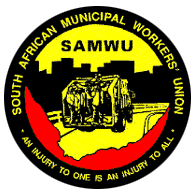Related Research Articles

The South African Municipal Workers Union (SAMWU) is the largest union in local government in South Africa.

The Federation of South African Trade Unions (FOSATU) was a trade union federation in South Africa.
Die Spoorbond was an Afrikaner railway trade-union formed in 1934 by H. J. Klopper, founder of the Afrikaner Broederbond, which advocated a policy of replacing all black railway-workers with Afrikaners. It rejected strikes and called instead for loyal service to the South African Railways and Harbours Administration (SARHA). The union had a membership of some 16,000 in the 1930s, considerably more than that of its rival, the National Union of Railway and Harbour Servants, which was forced to dissolve in 1937.

The Industrial Workers of the World (South Africa) or IWW (SA) had a brief but notable history in the 1910s-20s, and is particularly noted for its influence on the syndicalist movement in southern Africa through its promotion of the IWW's principles of industrial unionism, solidarity, and direct action, as well as its role in the creation of organizations such as the Industrial Workers of Africa and the Industrial and Commercial Workers' Union.
The Workers' Library and Museum was a non-profit labour service organisation (LSO) active in Johannesburg, South Africa between 1987 and the early 2000s. The organisation provided a meeting and learning centre for labour activists as well as students from the nearby Alexandra and Soweto areas. In 1994, it was expanded into the Workers and Museum in Newtown, Johannesburg, with the only museum in South Africa focussed on working people other than the Slave Lodge, Cape Town.

The Transport and General Workers' Union (TGWU) was a trade union representing transport workers, and at times workers in other sectors, in South Africa.
The Trade Union Council of South Africa (TUCSA) was a national trade union federation in South Africa.
The South African Typographical Union (SATU) is a trade union representing workers in the printing and media industries in South Africa.
The Amalgamated Engineering Union of South Africa (AEU) was a trade union representing white manufacturing workers in South Africa.
The Garment Workers' Union of the Western Province (GWU-WP) was a trade union representing workers in the clothing industry in the Western Cape Province of South Africa.
The General and Allied Workers' Union (GAWU) was a general union in South Africa.
The Hotel and Restaurant Workers' Union (HARWU) was a trade union representing hospitality workers in South Africa.
The Cape Town Municipal Workers' Association (CTMWA) was a trade union representing local government workers in Cape Town, South Africa.
The Urban Training Project (UTP) was an initiative to encourage black workers in South Africa to form new trade unions.
The South African Association of Municipal Employees (SAAME) was a trade union representing local government workers in South Africa.
The Amalgamated Union of Building Trade Workers of South Africa (AUBTWSA) is a trade union representing workers in the construction industry in South Africa.
The Amalgamated Society of Woodworkers of South Africa (ASW) was a trade union representing carpenters, joiners and those in related trades in South Africa.
The Sweet Workers' Union (SWU) was a small but long-lived union representing confectionery workers in South Africa.
The South African Equity Workers' Association (SAEWA) is a general union in South Africa.
The Motor Industry Employees' Union was a trade union representing workers involved in vehicle building in South Africa.
References
- ↑ Miller, Shirley (1982). Trade Unions in South Africa 1970-1980: a directory and statistics. Cape Town: Southern Africa Labour and Development Research Unit. ISBN 0799204692.
- 1 2 "Directory: South Africa's Independent Unions" (PDF). South African History Online. Retrieved 15 March 2021.
- ↑ "COSATU turns 20!". NUMSA. 29 November 2005. Retrieved 13 March 2021.
- ↑ Musi, Mojalefa (2010). Evaluating IMATU and SAMWU policy responses to Igoli 2002. Johannesburg: University of the Witwatersrand.